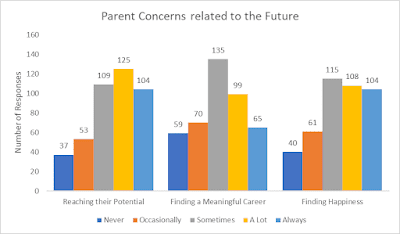But for most parents of gifted children, the worries don't stop when their child turns 18. Our grown kids drag their childhood selves into their adult years - replete with multiple complex interests, social quandaries, existential questioning, and emotional sensitivities. All of this results in a bumpy launch into adulthood for many gifted young adults. And as parents, we watch from the sidelines, questioning what to do and when to intervene.
In an online survey of 428 parents of gifted children conducted in 2022 (described further in The Gifted Parenting Journey), 54% of parents claimed that they felt worried "a lot" or "always" about whether their child would reach their potential (with only 8% indicating that they "never" worried), 38% worried "a lot" or "always" that their child would not find a meaningful career (with 13% claiming that they "never" worried), and 50% worried "a lot" or "always" that their child would not find happiness as an adult (with 9% indicating that they "never" worried about this). Clearly, most parents' worries about their gifted children extend well into the future.
What are some of the challenges that complicate a gifted or twice-exceptional child's path to adulthood?
Heightened sensitivities and excitabilities. Increased sensitivity and intensity can create difficulty when transitioning and adapting to new circumstances. Whether adjusting to a roommate, accommodating an ever-changing daily schedule, or navigating new and complex social pressures, gifted young adults may struggle.
The joys and stress of newfound freedom. Confronted with their longed-for independence, gifted young adults may be surprised that they might feel anxious. They may crave their independence, but now feel uncertain about making decisions on their own without relying on you to provide structure or support.
Social pressures. Gifted kids often struggle with asynchronous development when they are young, but may continue to lag behind their peers in terms of social maturity. This becomes a challenge when confronted with very adult decisions and multiple social expectations. They must learn to listen to their inner voice when faced with pressure related to drugs, alcohol, sexual encounters, or demands from roommates or friends. Introverted gifted young adults may have difficulty finding alone time to decompress when living in crowded conditions. Many also harbor insecurities stemming from a childhood where they did not fit in with peers.
Increased academic or career demands. Gifted kids frequently have an easy time with academic demands in high school. Most classes are easy, or at the very least, require only minimal effort. The stakes increase once they leave for college. Coursework might be challenging for the first time, which may be a shock for some. With fewer safety nets, increased demands, and steeper competition, the potential for failure looms large. And challenging career responsibilities leave little margin for error.
Executive functioning difficulties. Many gifted children coast through school with little need to develop the planning, time management, or organizational skills so vital to success. Now they must juggle a demanding schedule that differs from day to day without parents nearby to nudge them to complete their assignments or remember a meeting time. College and career provide a rude awakening to the importance of time management, remembering deadlines, and planning ahead.
Career choices take on added urgency. No longer free to dabble in what interests them, gifted young adults must decide on a career path that will be fulfilling, meaningful, and will pay the bills. Multipotentiality (possessing a range of abilities and interests) complicates their daily lives, as well as career planning. They struggle with decisions about career choices and grieve the loss associated with relinquishing endless possibilities and the luxury of engaging in multiple passions and interests.
Heightened existential and identity concerns. In addition to the stress of career planning, gifted young adults grapple with their sense of identity. This is similar to the existential awakenings that arose during middle school but creates an even greater sense of urgency. As noted in "What kind of gifted person will you become?" gifted folks have enormous potential, but also grapple with finding a path that is meaningful to them.
Who am I if I compromise and make choices that contradict my values?
Am I really smart if I fail a class or don't get hired for what seems like an ideal job?
What happens if I choose a career path that disappoints others or leads to my own disappointment?
What about my sexual or gender identity, my political and spiritual values, and my uncertainty about how much to assert myself?
How do I use my abilities for the better good and find a path that is fulfilling?
How do I navigate all of the complexities of the world around me, fight climate change and injustice, and still earn a salary that allows me to be independent?A tall order for all young adults. But all-too-common tendencies toward overthinking, existential angst, and perfectionism create even greater challenges for the gifted.


Your blog post delves into the often-overlooked emotional struggles that gifted children can face, despite their intellectual strengths. Could you elaborate on some specific strategies or interventions that parents and educators can employ to support gifted children as they navigate their emotional challenges? Tel U
ReplyDelete